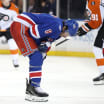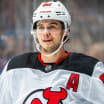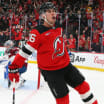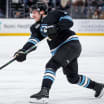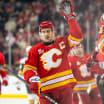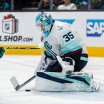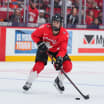NHL battled adversity, changed on fly during challenging 2021
Players, staff overcame COVID-19 concerns, weather issues to keep games going
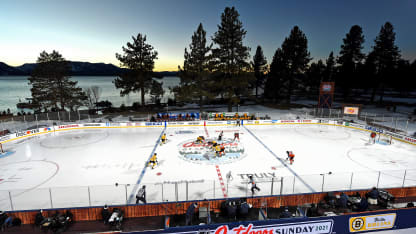
© Brian Babineau/Getty Images
He was there because the NHL couldn't hold its usual stadium events amid the COVID-19 pandemic, and so it was trying to turn a terrible situation into something special by staging two outdoor games in an unprecedented setting.
In charge of the spectacle, he kept working while crews cleared snow through the morning. He kept working as the Colorado Avalanche and Vegas Golden Knights tried to play at noon PT in the Bridgestone NHL Outdoors Saturday. He kept working when the game was delayed after the first period because it became too sunny, despite the partly cloudy forecast.
It wasn't until 8 p.m. PT that he finally visited the X-ray tent and got his diagnosis: spiral fracture of the tibia.
Lower-body injury.
"It's unfortunate," he said, "but it's part of the game."
Mayer pulled his boot back over his swollen foot, hobbled to his station for the second period at 9 p.m. PT, and got a walking boot and crutches during the second intermission. He finished the game without missing a shift.
The next day, he was back to see the Boston Bruins and Philadelphia Flyers play in the Honda NHL Outdoors Sunday as the sun set behind the Sierra Nevada, turning the sky shades of orange, yellow and blue.
"Oh, man," Bruins forward David Pastrnak said, "it was beautiful."
There is so much beyond the NHL's control -- like the pandemic, like the weather -- but the story of the NHL in 2021 is that there are so many people who push through adversity and adjust to whatever comes their way.
Think back to New Year's Day. Normally, the NHL would have staged the Winter Classic in a sold-out stadium, and each team would have been nearing the halfway point of an 82-game schedule. This time, the first training camps were starting.
The 2019-20 season didn't end until Sept. 28, 2020. The 2020-21 season didn't begin until Jan. 13. The NHL eliminated preseason games and shortened the regular season to 56 games. It was impractical to play in bubbles, so the League realigned temporarily to eliminate travel across the Canada-United States border until the Stanley Cup Semifinals and adopted 12 COVID-19 protocols (that were updated more than two dozen times).
The NHL had 12 teams shut down, 55 games postponed, 132 games rescheduled and more than 200 players on the COVID-19 list. Still, through it all, on went the show, and slowly, depending on the situation in each market, the fans began filling the stands again.
The NHL made it through a hurricane -- well, a tropical storm, anyway.
During the Stanley Cup Final between the Montreal Canadiens and Tampa Bay Lightning, Tropical Storm Elsa was headed toward Florida. With the Lightning leading the best-of-7 series 3-0 entering Game 5 in Montreal, Mayer and his staff pored over arena blueprints and weather maps to plan for two scenarios: awarding the Cup amid strict protocols in Montreal or scrambling to Tampa ahead of the storm.
The Canadiens won 3-2 in overtime in Game 5 on July 5, so the NHL packed the Cup onto a charter plane with rightsholders and essential personnel early July 6. Everyone hunkered down as the wind howled outside the hotel in Tampa, then got to work July 7, when the Lightning won the Cup for the second straight season.
"Think about playing in July in Florida," NHL Commissioner Gary Bettman said that night. "What are the odds? As I said from the outset, you have to be flexible and agile, and you had to be prepared to do whatever was necessary."
That hasn't changed.
The NHL returned to near normalcy to start the 2021-22 season with a full schedule, fans in attendance and relaxed protocols. The League went back to the usual alignment but with the Seattle Kraken joining the Pacific Division as an expansion team and the Arizona Coyotes moving to the Central. The Kraken opened Climate Pledge Arena, the New York Islanders UBS Arena. ESPN returned as a U.S. TV partner; TNT debuted as one.
Of course, COVID-19 continues to cause complications, even though almost all players are fully vaccinated and avoiding serious illness. The NHL has shut down nine teams and stopped cross-border travel through the Dec. 24-26 holiday break, and it has enacted enhanced protocols to be reviewed no later than Jan. 7. It has postponed 64 games and announced Dec. 22 that NHL players will not participate in the 2022 Beijing Olympics.
Again, there is so much beyond the NHL's control -- like the pandemic, like the weather -- but the League will continue to push through adversity and adjust to whatever comes its way.
It's part of the game.
